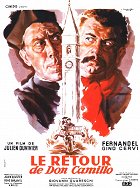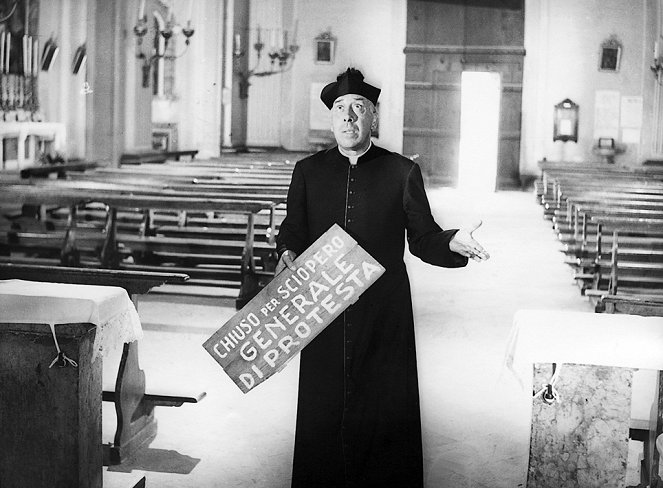Director:
Julien DuvivierCámara:
Anchise BrizziMúsica:
Alessandro CicogniniReparto:
Fernandel, Gino Cervi, Paolo Stoppa, Leda Gloria, Enzo Staiola, Édouard Delmont, Ruggero Ruggeri, Alexandre Rignault, Saro Urzì, Jean Debucourt (más)Sinopsis(1)
Tras la pelea con el alcalde Peppone, el obispo ha elegido un nuevo destino a Don Camilo. Un pueblecito de montaña muy indicado para que medite un párroco "de acción" como él. Mientras, en Brescello, dejando a un lado los conflictos ocasionados por la construcción de un dique, todos echan de menos a Don Camilo: los ancianos del pueblo se abstienen de morir, los niños se niegan a nacer y los enamorados a casarse sin la ayuda del cura del pueblo. Mientras, ajeno a lo que sucede en Brescello, Don Camilo se dará cuenta que está en el sitio equivocado y que es en su casa donde le necesitan. (A Contracorriente Films)
(más)Reseñas (1)
At the turn of the 40s and 50s, Italian cinema was at its peak and Italian neorealism became a concept for both film critics and film enthusiasts. However, the demanding and experimental films of Rossellini and his generational counterparts were not the most visited in Italy, as was the case with the Czech New Wave. Audiences preferred popular comedies, and popular Italian comedian Fernandel managed to score points in this category with a series of films about the freethinking and outspoken priest Don Camillo. He created a phenomenon that has endured in Italy to this day. The scripts of the individual episodes were based on the post-war political situation in Italy, where the Christian Democratic Party and the Communist Party played a leading role, represented in the film by both a rural priest and a communist mayor. The creators depict their mutual quarrels in a generally tolerant manner, despite various twists and escalations. The humor contained in the film is human. In the end, both rivals manage to find a common language in moments when things go wrong for them and the residents of the town. (In the case of The Return of Don Camillo, quite literally.) Overall impression: 75%.
()

